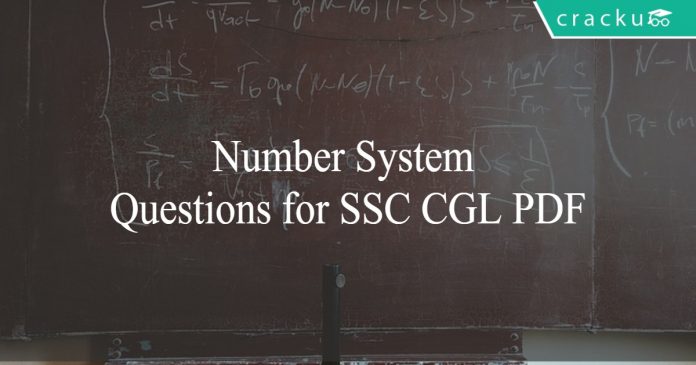Number System Questions for SSC CGL PDF:
Download Number system questions for SSC CGL Tier-1 and Tier-2 PDF. Maths number system questions for competitive exams like SSC CGL. Number System Questions with answers explained with detailed solutions and explanations using tricks.
Download Number System Questions for SSC CGL PDF
Question 1:
The least number which when divided by 6, 9, 12, 15 and 18 leaves the same remainder 2 in each case is :
a) 180
b) 182
c) 178
d) 176
Question 2:
What is the arithmetic mean of first 20 odd natural numbers ?
a) 19
b) 17
c) 22
d) 20
Question 3:
The least number that should be added to 2055, so that the sum is exactly divisible by 27 is
a) 28
b) 24
c) 27
d) 31
Question 4:
The digit in the unit place in the square root of 66049 is
a) 3
b) 7
c) 8
d) 2
Question 5:
A certain sum will amount to 12,100 in 2 years at 10% per annum of compound interest, interest being compounded annually. The sum is
a) 8000
b) 6000
c) 12000
d) 10000
SSC CGL Previous Papers Download PDF
Solutions: 1 to 5
1) Answer (b)
The numbers 6,9,12,15,18 leaves same remainder 2 in each case.
So, what we need to do is find the L.C.M. of these numbers and add 2 to it
L.C.M. of 6,9,12,15,18 = 180
=>Required no. = 180+2 = 182
2) Answer (d)
NOTE :- Sum of first ‘n’ odd natural numbers = n^{2}
Sum of first ‘n’ even natural numbers = n(n+1)
Sum of first 20 odd natural numbers = 20^{2} = 400
Arithmetic mean = 400/20 = 20
3) Answer (b)
The remainder obtained by dividing 2055 by 27 = 3
So, the least number that should be ‘subtracted’ from 2055 to make it perfectly divisible by 27 = 3
and the least number that should be added = 27-3 = 24
4) Answer (b)
Square root of 66049 = 257
Thus, unit’s digit = 7
5) Answer (d)
Let the sum = x
rate = 10% and time = 2 years
Amount after compound interest = $x (1 + \frac{10}{100})^{2}$ = 12100
=> $\frac{121x}{100}$ = 12100
=> x = 10,000






[…] Number System […]